I was mostly happy with the Covid-style approach I tried out last time. This is an update of ‘all the things worth noting since then’ but excluding prediction markets. I plan to do a prediction market update next, and keep those two tracks distinct. I do talk a bit about how I would characterize various final settlements, with an aim of getting prediction markets that can better reflect the nature of the final outcome.
Note that there is also an essentially endless list of claims of Russian war crimes and crimes against humanity, and I’m almost entirely not including them. You do not need me to tell you about this aspect of what is going on.
Lots of detail keeps coming in, and there are many incremental changes and updates, but the central facts seem similar to how they seemed as of my last post, so I won’t be re-summarizing them. Things are no longer moving quite so fast.
Potential Donations
From Bloomberg on March 15, an economist talks about fighting for Ukraine.
Here is the money quote, file under Huge If True (but I can’t evaluate it).
We don’t need food or paper towels. What the army needs is munitions and people need medical supplies, specific medical supplies. Most people die from blood loss after a cluster bomb or after some kind of ballistic missile falls. There may be 20 or 200 people wounded. It’s a little bit like when an airplane cabin loses pressure, the masks fall down — and what you need to do is to put the mask on yourself and then help others. So in this case, the mask analogy is a medical kit, which allows you to stop bleeding. So you really have to ensure that you are not bleeding, and then that people next to you are not bleeding.
So you have to have a lot of these medical kits, and they usually cost 10 or 20 bucks. But now of course they cost 100 bucks because it’s surge pricing and no one can deliver. So we are trying to focus on this specifically. Civilian authorities need them and even railroads are asking for these medical kits because evacuation trains get shelled and people die without this specific kit. We will deliver them. We have connections, there’ll be no [extra overhead charges]. It doesn’t get stolen on the way. And [your donation] is also tax deductible in the U.S. So for $100, you’ll save a life and get your taxes back.
There is a catch. It’s not so easy to actually get things where they need be.
And you need to get suppliers. In war, there are so many intermediaries and fees. So you have to establish a procurement department to figure out who is serious. Once you have suppliers, you have to figure out all the [wartime] export licenses, all these government regulations. And of course things get stolen on the way. For example, one large, well-known American charity sends 95 pallets of medical supplies to Ukraine. When it arrives, it’s only two pallets because 93 of them got stolen somewhere. Not in Ukraine — either in Poland or even in New Jersey. So you have to watch for this. You actually have to put your own people in Warsaw or in New Jersey, in Israel, in Sweden, to check what has been loaded at every point so that it doesn’t get stolen. It’s a logistical nightmare. And when you finally get it to Ukraine, people are shooting at you at checkpoints.
…
One specific thing: We need 307,000 medical kits. I have the specification. Let’s say Israel can only supply 30,000 and Canada probably can supply 20 or 30,000. But we have suppliers who can provide the medical kits. We give this specification to [Ukraine’s] Ministry of Health, and our charitable foundation will pay. So tag me or email me or ping me on Twitter — and then donate, please donate.
All the fundraising goes directly to logistics. I have a website at the university of the charitable foundation [Kyiv School of Economics Humanitarian Relief Fund], and there is a Twitter post at my account. If I get a hundred dollars on that charitable foundation, it goes towards medical kits and it’s likely going to save a life.
These claims seem at least plausible. If they are, then you don’t save a life for $100 on average because obviously each kit saves a lot less than one life, but this seems likely to be competitive with other life-saving causes on purely humanitarian grounds. Any impact on events beyond that would then be a bonus. So I’m very curious.
War Aims
Speculation from March 20 on Russian war aims. Model here is that Russia planned ‘spontaneous’ ‘People’s Republics’ across much of Eastern Ukraine, which it then could absorb in time. With military setbacks, the model says this plan has scaled down but is still mostly present. Mariupol is then the defiant city that wouldn’t give in, and must be punished for symbolic reasons, more than it has military value. Many others however disagree and think that the military value of Mariupol remains high.
Military Progress and Conditions
Mariupol does also seem to be falling, if slowly, into Russian control. Here is a Russian-aligned source discussing their view of the failed ultimatum where Russia demanded the city surrender. The line taken is that the demand because Russia still views this as a ‘special operation’ with similar people so surrender should be no big deal, but of course Ukrainians do not see it this way. Which is an interesting way to present ‘we threatened death and destruction to get them to give up, and they said no.’
Article in The Atlantic where a marine fighting for Ukraine details what it has been like. Describes Russian army as completely command controlled whereas Ukrainian soldiers can take initiative and can run circles around them, and also a new situation where armored vehicles are potential sitting ducks, which is all verified by other sources.
Thread from 19 March estimating casualties. Early numbers for Russia are on extreme high end since they are Ukrainian claims, Ukrainian numbers likely low. Russian source later gives 9,861 killed and 16,153 injured on 21 March.
In general, Ukraine does seem like (based on tallied visually confirmed equipment losses) to be a bad place to be a Russian ‘unknown truck.’
NATO estimates Russian deaths at 7k-15k (thread is another general assessment), in line with the above. That’s only deaths, and generally several times that many are injured or desert, and thus unable to continue.
Ukraine claims Russian forces have ‘only three days of ammunition and food.’ No idea either if this is accurate, or if it is normal, but gives an idea of how fast it could be an issue if troops were cut off from supply.
March 24 Twitter thread assessment of state of play, saying both sides forces are increasingly exhausted, sanctions have disappointed and will need to be ramped up especially with respect to oil and gas, and an expectation that territorial ‘facts on the ground’ will play a key role in final settlement, which I’ll discuss in its own section.
March 24: Russia claims to have captured Izyum near Kharkiv, which Ukraine denies. Then Ukraine claims to have recaptured Lukyanovka nine miles east of Kyiv which is crucial to local supply lines, potentially encircling some troops although other reports doubt this, and some other areas further east of Kyiv, with the distance of Russian forces from the city increasing. The rate of reports of successful Ukrainian counter-attacks seems to be increasing. Ukraine also claims progress in other areas, while Russia makes clear progress in Mariupol.
From AFP, a map of the area around Kyiv:
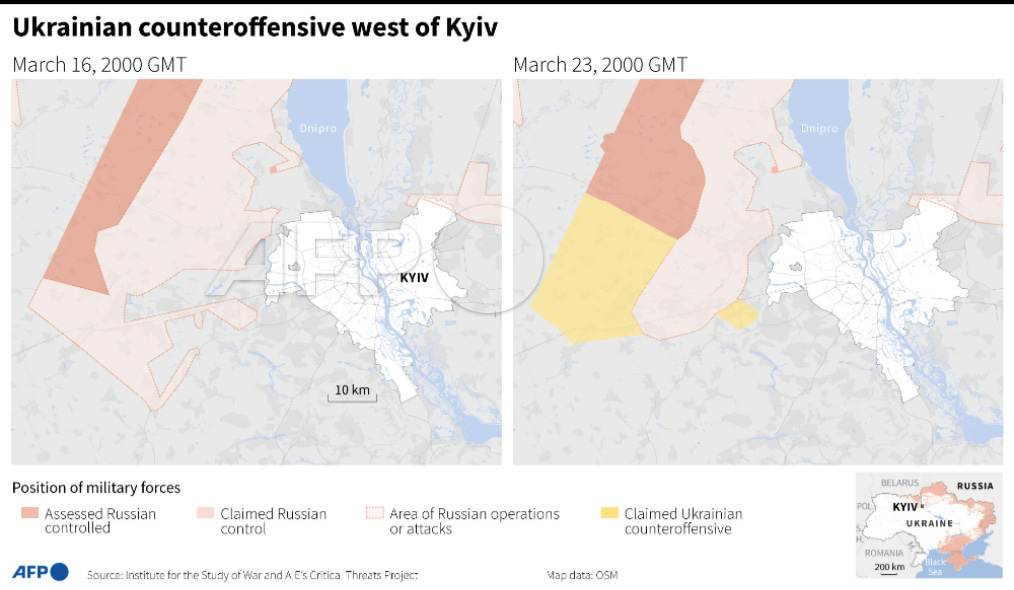
The amount of yellow here makes this look like more progress than it is, but this does seem like a net better position than a week ago, and if remotely accurate then Kyiv is in no danger of encirclement.
Another thread from 24 March assessing the broad state of play, with Russia not making progress and transitioning to defensive positions except in Donbas, and Ukraine going on the offensive near Kyiv. Lots of great low-level details here.
If Ukraine can relieve the pressure on Kyiv, that would potentially free up quite a lot of troops for other operations that are currently defending Kyiv. If anything Kyiv already feels far too well-defended, despite its importance. If a bunch of those defenders can travel that would be big.
Russian soldiers potentially experiencing widespread frostbite.
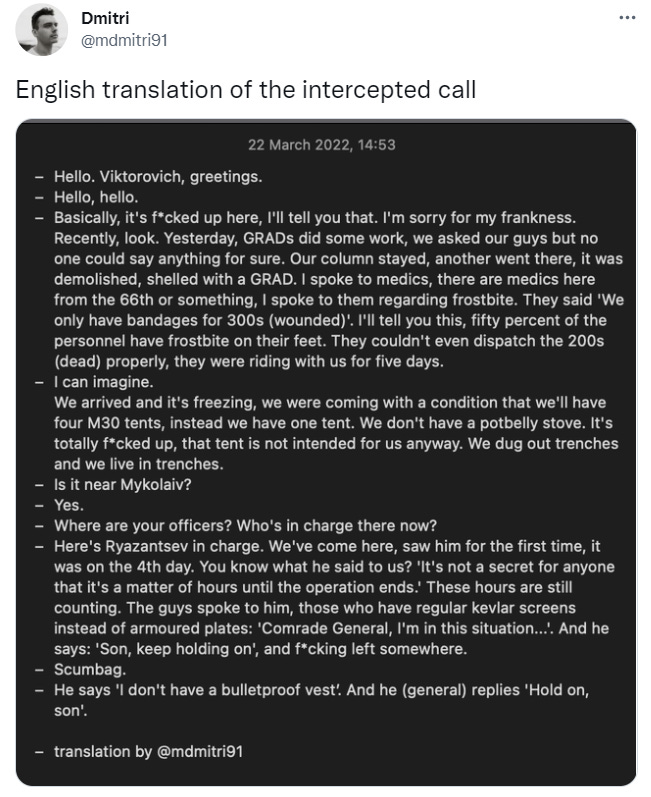
I do hear Russia is cold and equipment provided was poor. It does seem strange that Russia does not prepare properly for Russian winter, you’d think that would very much fall under #YouHadOneJob. In a non-functioning system that is one too many.
Assessment that a war of attrition is coming. Getting to this stage is a win for Ukraine, but who is favored if Russian positions do not collapse and supply is maintained, settling in for a long war? That depends on which side can put in more effective resources. It is not clear to me that Russia can bring that much capacity to bear, but in theory it could. Some commenters expressed skepticism that West will be willing to provide material support in large amounts indefinitely, but that seems like exactly the kind of thing we would do once we work out how to do it.
An analysis of how map displays have changed throughout the war, to downplay Russia’s progress and offensives, and to showcase Ukrainian forces.
We started with this.
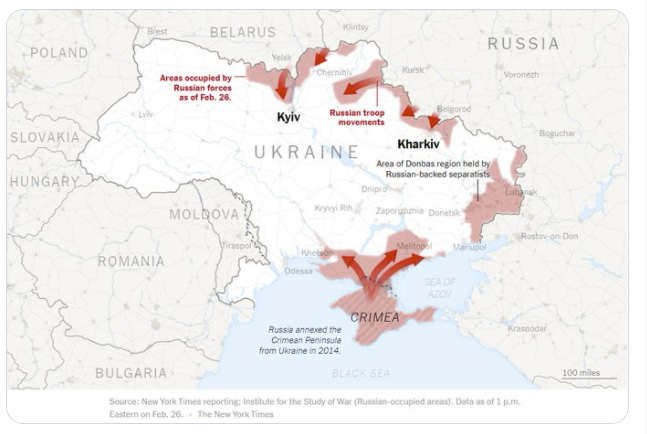
Now with mostly the same situation, we have this.
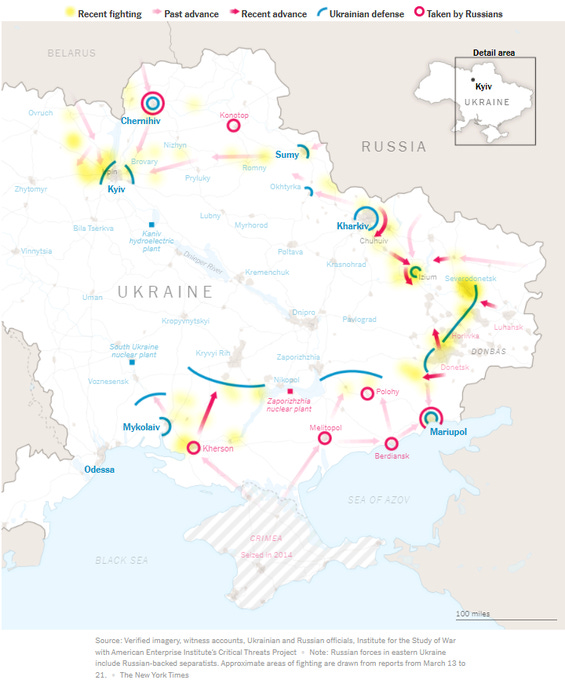
One can take a cynical propaganda view here, or a view that the new maps are more reflective of the realities on the ground. Or both. I am inclined to say both, but with a clear move from a bias in one direction to the same bias in the other direction.
Here is a thread with some more telling maps from 24 March.
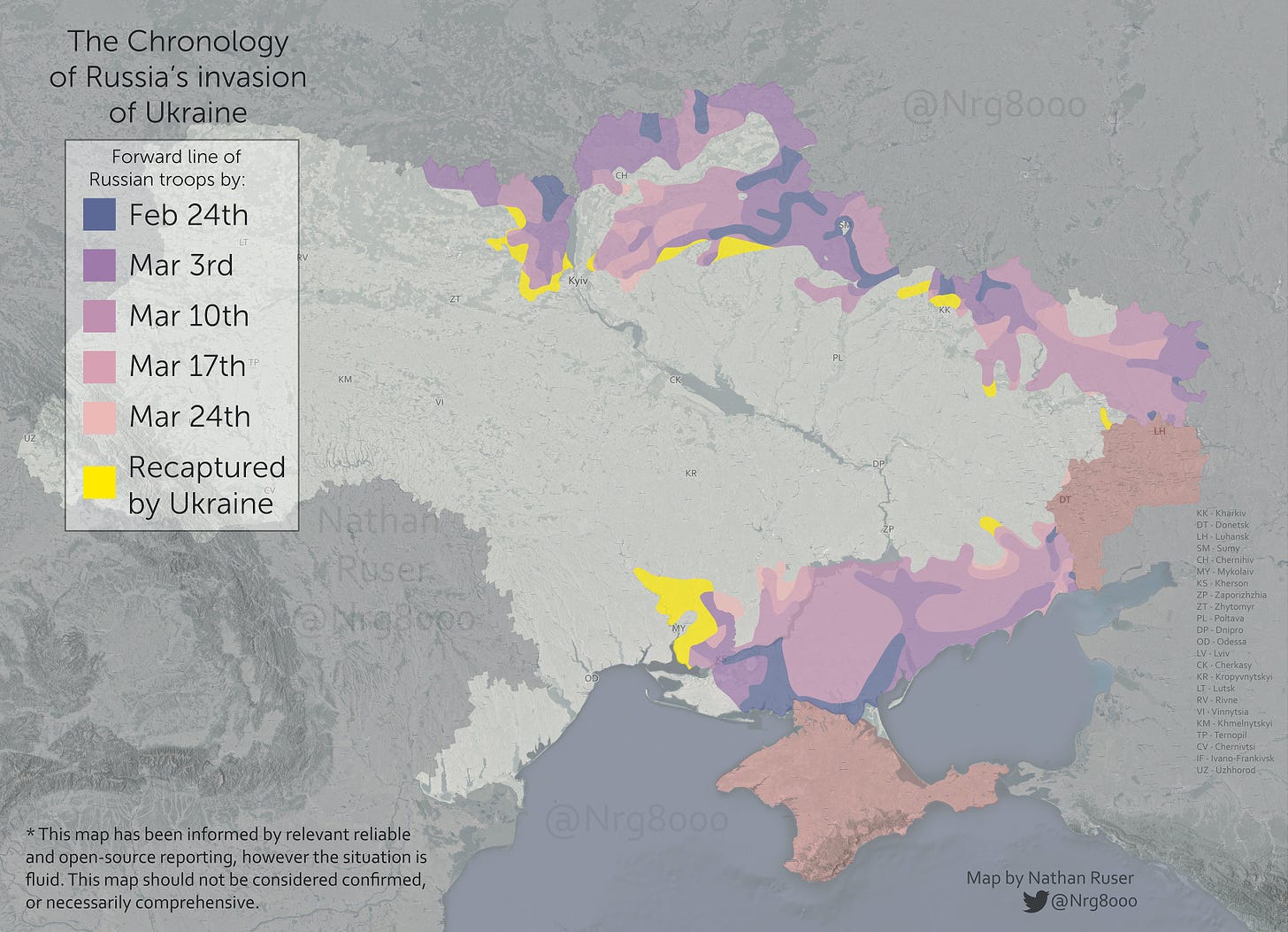
Forward movement of Russian troops and areas of firm control:
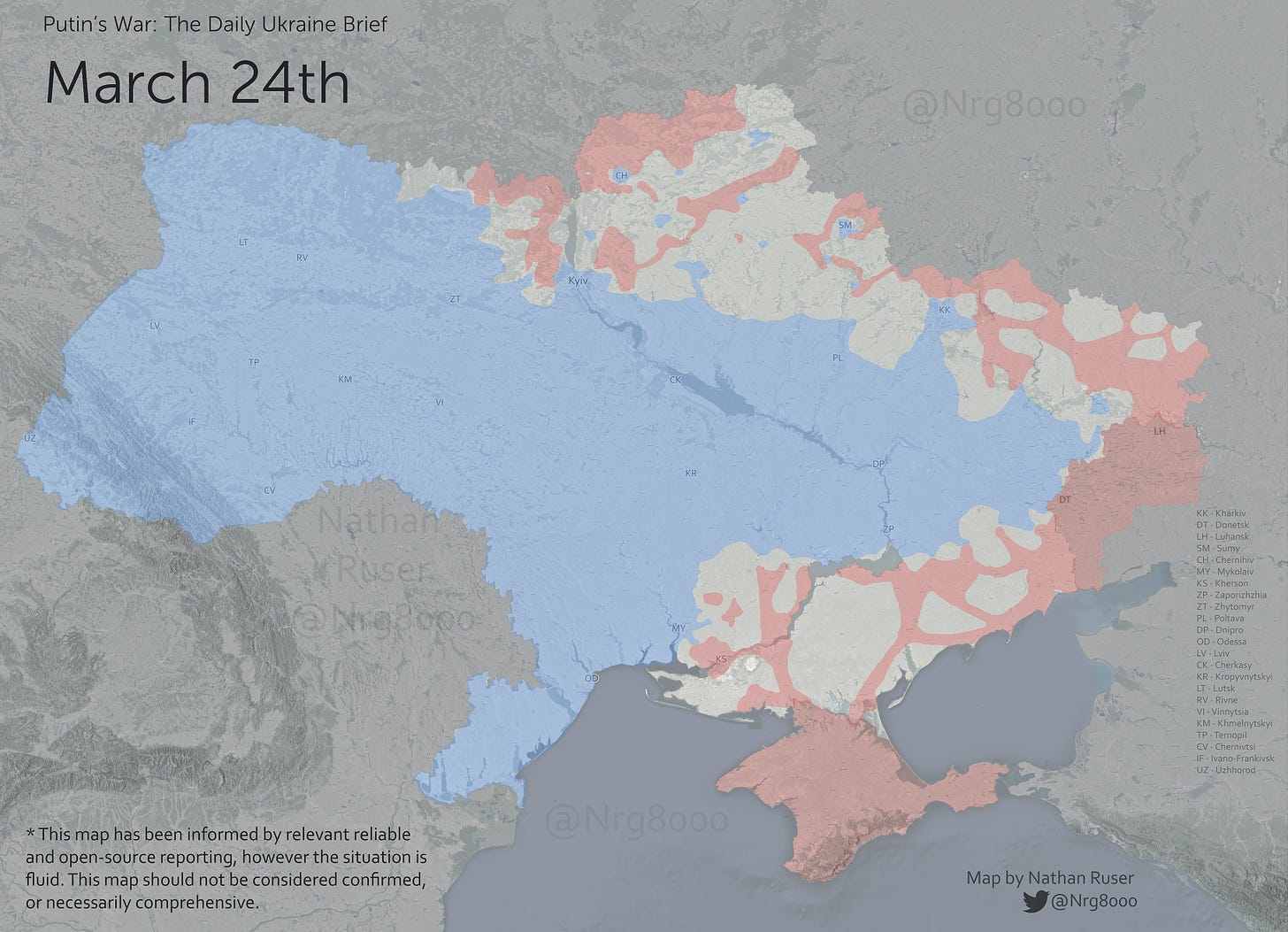
Or the forward line:
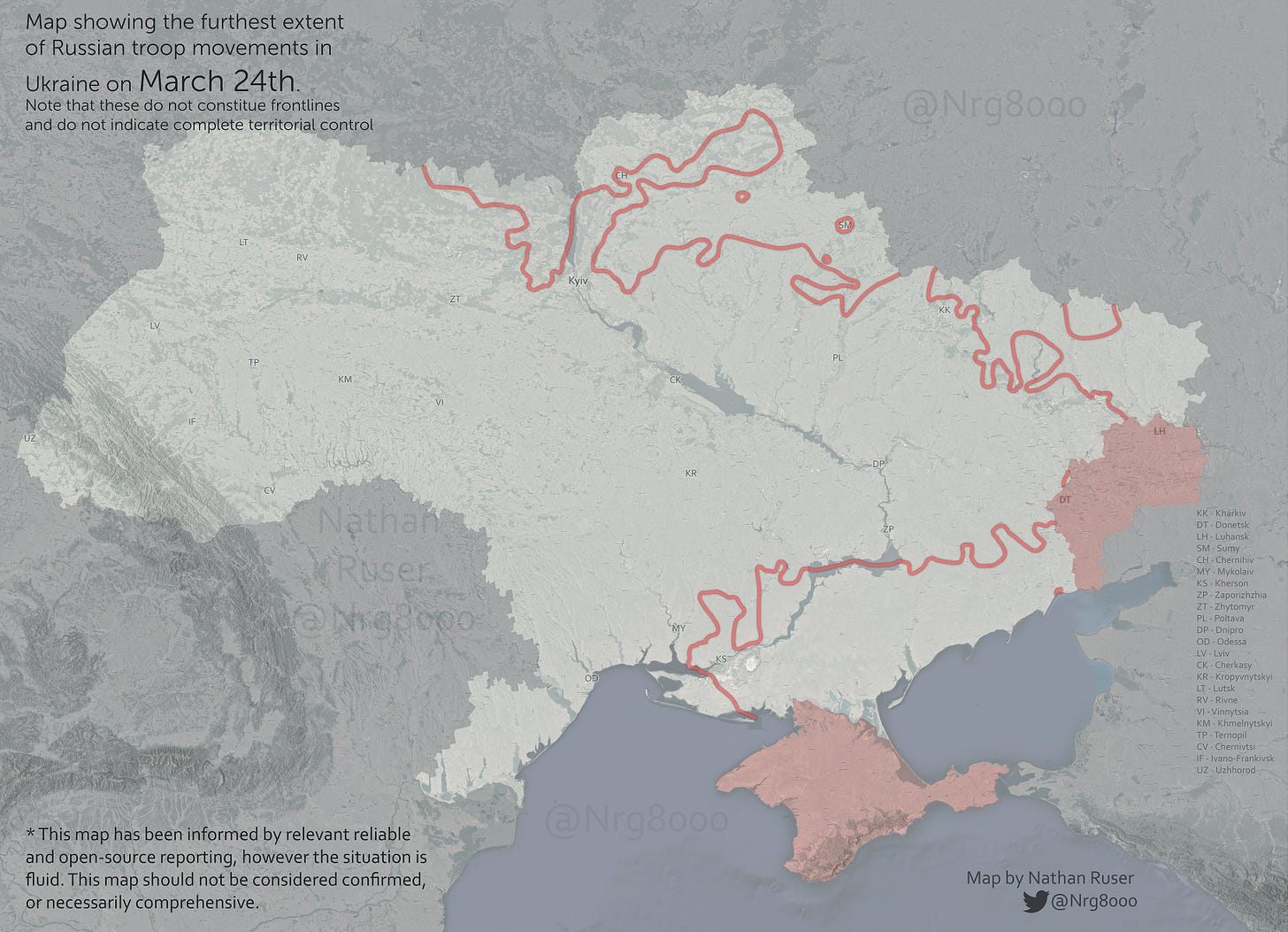
The roads taken:
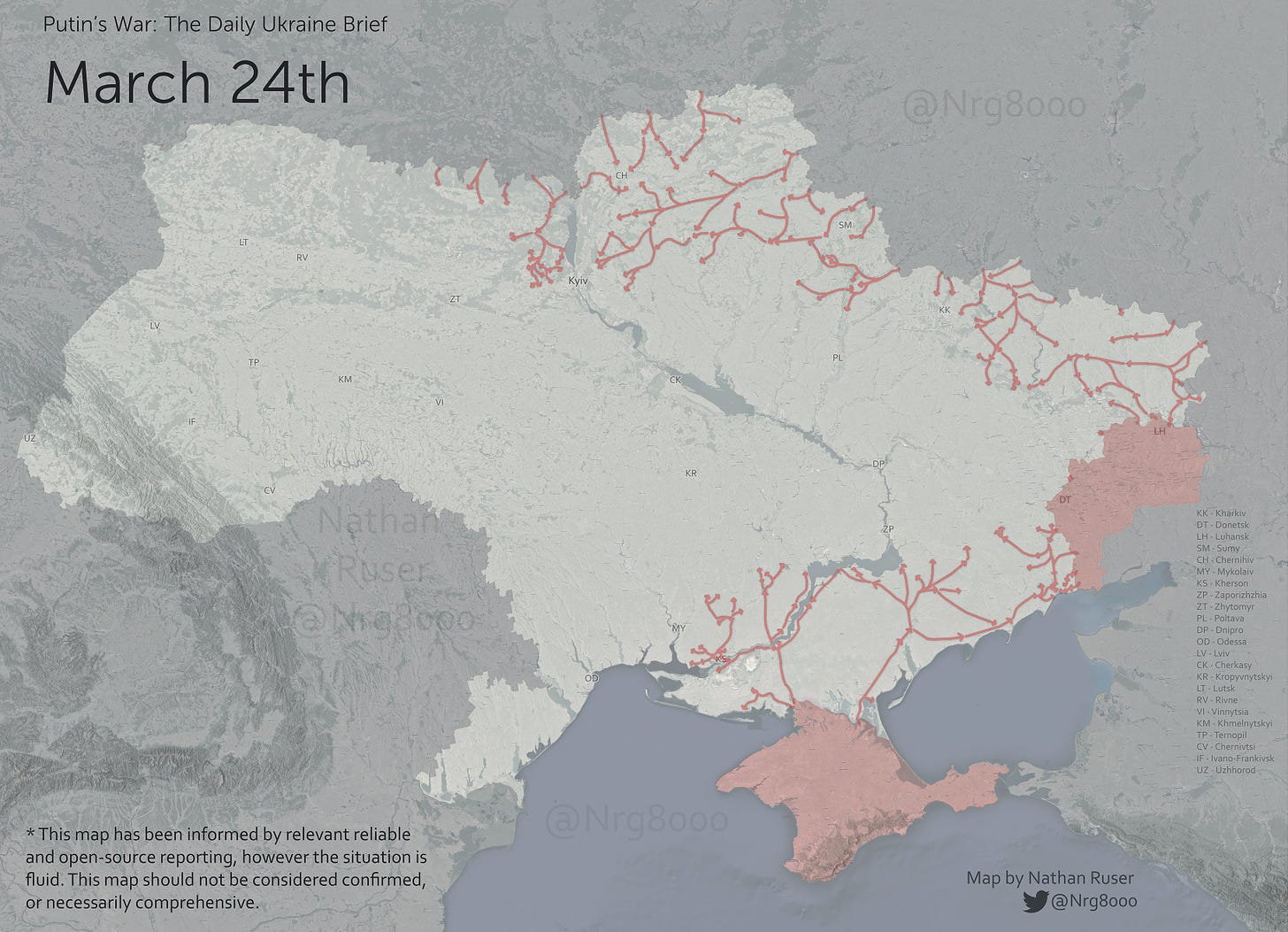
And finally, around Kyiv.
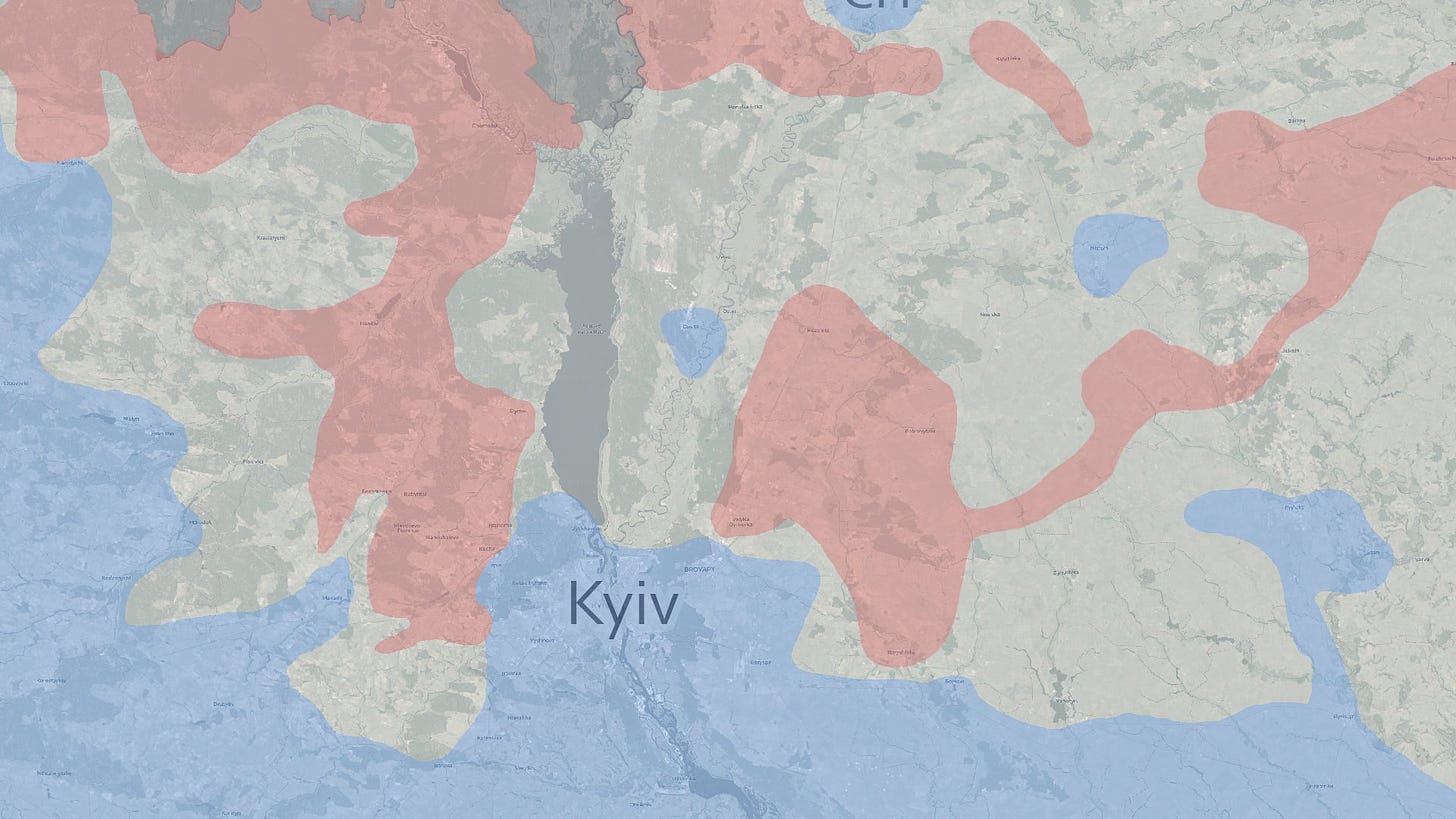
In Putin’s Russia
Technically Russians have the right to peacefully protest. In practice of course they do not. That leads to scenes like this.
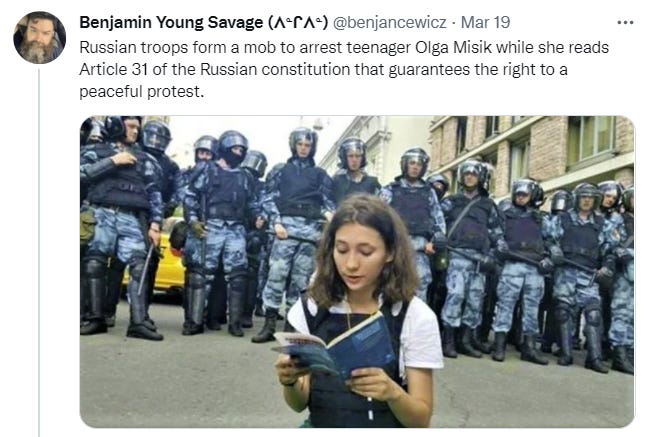
When I see a photo like this, my instinctual interpretation is that this is a collaboration between Olga and the troops behind her to generate the photo opportunity. Normally when a photo is staged it makes it less powerful. Here I wonder if the reverse is true. If the troops are intentionally helping to create powerful photos of protest then one could say that is the troops joining the protest. Which makes this interesting.
There have also been reports of the classic Russian joke come to life where people are arrested for holding up blank signs and leaflets (“What is there to say? It’s obvious!”) or arrested for signs with asterisks (“***** ***”) as denigrating the troops.
As noted in the detailed operational thread from the previous section, Russia is increasingly framing this war internally as existential. Which is an odd thing to do while continuing to deny it is a war, forcing a kind of doublethink. It also has to be considered in light of Russian nuclear policy, which was affirmed as only to be used when the existence of the state is threatened. So then it becomes vital to represent that you see a threat to the existence of the state.
Russia also claiming that Hunter Biden personally financed the Pentagon’s Ukrainian biological weapons labs. Bingo, sir. Why not throw it all together? Once your claim is obviously false, why stop? Better to max out benefits of asserting the obviously false.
Russia’s only tank producer halts production over lack of supplies.
Russian stock market reopens and rallies, foreigners can’t sell and government is buying. If you are private Russian citizen, I would try not to be long this time next week. It was down the next day.
Russian economic prognosis looks grim. The claims that Russia can ‘pivot to China’ in various forms seem like they are better than total failure but do not seem like they offer much hope of a rebound. Also points out that Ukraine’s economy has been a dismal failure for 30 years and this is likely due to those with power in Ukraine having had an anti-growth agenda. Ukraine can be successful after the war assuming it survives, but it needs to turn that around even more than it needs help.
Biden wants to expel Russia from the G20, despite no obvious procedural way to do that. Russia says that exclusion from the G20 ‘would not be “fatal”.’ Which seems like one of those denials that raises a lot of questions it proports to answer, and makes me think it would be more effective than I would have otherwise expected.
Russian troops refuse to go to Ukraine on grounds they do not have passports, so Russia fires them. Not only are they not going to Ukraine and not under arrest, they are suing claiming they were fired illegally. I bet there are quite a few others who would if they found out about this be kicking themselves for not ‘getting themselves fired.’
Nestle continues to provide nutritional services in Russia, with profits going to humanitarian relief, suspends its anti-nutritional brands from operating. Response seems to be to treat this as insufficient and to vilify Nestle.
Russia faces shortages of medical supplies, including insulin. Officials blame ‘panic buying.’
Finland closes its passenger rail connection to Russia. This seems like a pure unforced error, as the train could be used to allow Russians to flee and now it is gone.
According to a Russian news article, 70,000 IT personnel have left and another 100,000 will follow. Google estimates this is out of an IT work force of 1.3 million, so substantial but not obviously a crisis level problem yet.
Oil and Gas
There is a ‘grace period’ for Russian oil? Soon to be a major motion picture: A tanker just left port and has until April 22 to deliver.
I do understand and sympathize with the basic problem Europe is facing. Did they do it to themselves as a completely unforced error by relying on Russian oil and gas for no reason? Well, all right, yes, they did that.
Did the dynamics involved greatly contribute to Russia’s decision to invade Ukraine, thus making them even more responsible for their own mess? Well, all right, that too.
So I understand the hesitation, and find it pleasantly surprising that they seemed increasingly ready to perhaps pull the trigger anyway, even if it was far from clear they would do so. Then Russia decided to give them a little push, and demanded that payments be made in Rubles, claiming Euros and Dollars were ‘compromised’ currencies.
My first thought on that was definitely to reply ‘oh, all right, of course that will be at the official exchange rate’ and then put a huge grin on one’s face, but another alternative is to use this shift from ‘it flows automatically unless you come together and cut it off’ to ‘it stops flowing unless you come together and actively stop it from being cut off’ to grow a spine and/or do Europe’s favorite activity of ‘nothing’ very well, and let nature heal.
Poland actively said no, then the Dutch and it seems now all of Europe. Which puts Putin in a highly awkward position. Either he caves on the payments, or he shuts off the gas.
It is still a tricky problem, when you are ideologically devoted to not using nuclear power (thanks in part due to Russian propaganda) and are incapable of pretty much ever doing anything so they can’t even do things like a campaign to mass-manufacture heat pumps.
American and Europe have reached an agreement on LNG, which should help somewhat. Germany claims it is making ‘drastic slashes.’ There are many signs the European public is willing to do a lot more a lot faster, but officials some combination of don’t know how and don’t believe the public. They don’t know how to do much of anything quickly pretty much ever, the physical problem is hard, the solutions cost money and they’ve tied their hands on budgets, and when they don’t ‘believe the public’ I agree with them. As in, they say they would be willing to endure the cold and have real shortages and high prices, but is that how they would vote? Historical analysis suggests this is unlikely.
For America I feel no such sympathy.
America has a problem. Gas and oil prices are high.
Given that America produces as much oil and gas as it consumes this does not seem to me like it is a problem.
Yes, it is a distributional problem, in the sense that it transfers wealth from those who consume to those who produce. But there’s an easy fix for that. You can impose a tax on oil and gas profits, and return that money to consumers as a rebate. Or you can tax the gasoline and return the money as a rebate, since tax incidence will be some mix of consumer and producer, and because raising the price of gas will lower consumption, which is half of how one fills the gap on the world market from the missing Russian oil.
We could also do things like restart the keystone pipeline. The counterargument there is that this would take years to actually transport anything, so what’s the point? The argument at the link is that reopening the pipeline (1) signals a future price decrease due to increased supply which (2) leads to more deployment of reserves now which (3) lowers the price now.
I don’t fully understand the economic argument here, because it only functions if future prices are anticipated to be higher than current prices. I checked the market data and that’s very much not true. Who would want to hold onto physical oil right now as a private investor? Sure, you might buy oil futures, but that’s strictly better. If you have oil now, you already sell it.
On the contrary, last time I suggested the government buy long-dated oil futures and sell oil from the strategic reserve to compensate. Does anyone have a reason why this wouldn’t (1) be profitable and (2) work to lower current prices and (3) work to increase production?
Then again maybe it wouldn’t increase production? Bloomberg surveyed oil producers for why they were failing at their #YouHadOneJob of producing more oil when the price went up, and a lot of them said they would not collectively go into growth mode increase production at any price.
Of those who had a price, the price was mostly remarkably cheap.
This is deeply weird. If price goes up and you can produce at some price, you… produce more? Maybe you sell futures to hedge?
The oil price is not the constraint. The primary constraint is capital, and then other factors like politics, ESG considerations, regulations, and supply chain issues are secondary.
Damn you, ESG and political considerations and regulations that are doing the opposite of what they are supposed to be doing right now. Damn you!
But more than that, shareholders and the market are kind of insane?
Overwhelmingly, its investor demands for capital discipline holding back new drilling.
…
After a decade of huge losses, as a result of aggressive capital expenditure, shareholders are prioritizing cash flow above all else. And the executive teams at these energy companies are getting the message.
If shareholders stand ready to punish those who can buy something low and sell it high, then A Fool and His Money need to soon be parted via changes in ownership. Can we call in some private equity? And further discard the EMH?
Purchase guarantees also seem fine, especially if they run both ways and government has right of first refusal at the fixed price. Something that blew my mind when I first saw the numbers was simply that Russian oil and gas is not that much oil and gas in the context of the global market. It’s a few percent. We don’t have to work that hard to make up for it, modulo the need to work on transportation issues.
Or, when you see something where there is a shortage due to excess demand and not enough supply, with supply short-term inelastic, and producers are using profits to fight a war, you could… subsidize demand?
This is actually much less dumb than it sounds. Given the size involved this is basically writing checks to vehicle owners, and then the money is fungible. It’s not like any of these cards won’t get used. So this should primarily be an income effect. The gas is not free on the margin unless you consume less than $800 worth of gas, which would mean you rarely if ever drive much, and (2) can’t sell or otherwise transfer the gas to someone who does. So my guess is the prices at the pump should move almost not at all, and this is fine? It’s an increase in the progressiveness of the California tax code, and a transfer from any walkable areas in California (?) to non-walkable ones.
Reminder that American gas prices even when super high are super low.
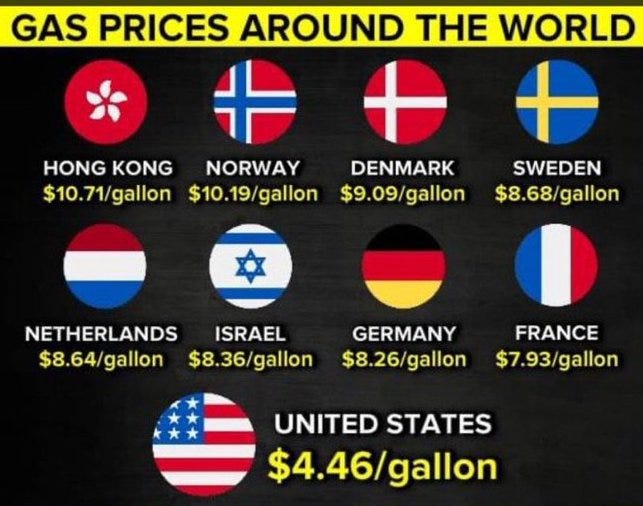
We really are a bunch of whining babies about this one. And our politicians do not control the government, for example after much struggle the Post Office under Biden is now going to buy 20% of its new vehicles as electric vehicles – and 80% non-electric, but also complete inability to manage regulations to actually build or accomplish anything pretty much ever. I know, yes, ‘politics’ and all that, but seriously what the hell. And yes, I know ‘built lives around the expectations of’ but if you want those expectations to change how do you intend to do that?
Ideal would be to tax the thing you want to see people use less, so naturally instead everyone is falling over themselves to cut the gas tax. Which even Germany is doing, likely along with a number of American states. If Germany wanted to not have energy and hurt the climate, would its actions be different?
Manchin, whose permission is necessary to ever do anything these days since no Republican is willing to vote for any meaningful spending, seems to be actively pushing for an ‘all-of-the-above’ style energy bill. His offer seems to be, you give me more oil and gas, and I’ll give you more for other energy sources, and also some other spending and taxes you want as a bonus. It isn’t in this article but I’ve even seen that he’s in favor of ‘advanced nuclear power.’ So he’s essentially screaming to make a deal where we do a bunch of stuff we should be doing, and in exchange he’ll sign off on other stuff, and somehow this still is not getting done.
EU Style
The part I do understand: The European Union works by unanimous consent. If they want to do anything that is not already on autopilot, even a single veto seems to be sufficient to stop them. In particular, Hungary decided to veto a bad on Russian gas, or any sort of peacekeeping mission or no-fly zone, so unless they change their minds that it that.
The part I do not understand: Why everyone else can’t agree to do it anyway.
If a group decides something unanimously, and has the power to do it, they can do it. That would take them outside the formal channels of the EU (or in another context of NATO) but I do not see any barrier to an agreement to stop importing Russian gas followed by everyone who agreed to it no longer importing Russian gas. Hungary would keep importing, but that does not seem like that big a problem.
China Style
Article looking at Chinese relationship with Russia in light of the war. A lot of the overall picture seems clear. We know China knew Russia was going to attack, but that what it did not expect was for Russia to botch the operation, and likely it also did not expect a full invasion. But Xi is personally ensuring that China backs up Russia at least somewhat. The war is directly hurting China’s interests in the sense that it is driving up the prices of many things China buys, and forcing China to support Russia rather than other way around. Perhaps China still turns a profit by buying up Russia on the cheap, but the risk of disruptions in its much bigger trades with the West seem large.
I do not expect China to provide the kinds of aid that would endanger China’s trading relationships, so they would have to stick with things that would not provoke such a reaction. That could still be a substantial impact, and also they could end up being wrong about what provokes a reaction, or the threshold could change steadily over time. Rather than the expectation by some that Western willingness to pay costs will decline over time, I expect to see the opposite by default if Russia presses forward.
I understand there is a widespread Chinese argument that is essentially (don’t have the link) ‘why should we help you fight our friend now so you can concentrate on us next?’ Or otherwise to view the broader situation as an inevitable USA-China conflict, and thus China needs to support Russia.
This raises the central question about China. To what extent is Xi’s and/or the Party’s and/or China’s view that the world is essentially zero sum? I don’t know.
Trump Style
A former president said some words. Now hear him out.
Now I do concede that one would not call any of that ‘literate’ or deny that it constitutes ‘word salad’ and we should all slow down to appreciate the nonsensicalness but also the poetry and evocation involved.
One could even call the lack of proper word usage a feature. The goal is to string together snippets that point in the direction of potential associations and actions, that paint a picture regardless of its lack of logical cohesion. If part of this game is not telling them what you wouldn’t do and keeping them guessing, that’s the idea, while still letting others calibrate on intent.
The basic idea is clear. Do not use the air force, that would cause an incident. But one can use gunboat diplomacy with the navy (‘coasting up and down your coast’ is a great line, don’t try to deny it) and with other forms of aid. General incremental escalation, with a side of ‘I have no idea what I am talking about so who knows what I might do.’
And yes, Ukraine is indeed doing ‘an amazing job’ even if you think they are in long term trouble.
Peace Talks and Victory Conditions
There has been a lot of discussion in the comments and elsewhere about who will ‘win’ the war. It would be good to have prediction markets on this directly, but we mostly don’t because of definitional issues. What does it mean to win? Could we make a prediction market for this that would work?
Suppose you were playing an Avalon Hill board game called Putin’s War. What would be the victory conditions for each side, as measured by the state of play after the war?
What would be a minor, major or total victory for each side?
Last time, I summarized the discussions over peace talks as breaking down into three areas, and I would add a fourth to cover sanctions, as it does not seem fully obvious that they will be fully lifted after this ends.
Territorial concessions.
Demilitarization and Non-Alignment.
‘Denazification.’
Sanctions and potentially reparations.
Denazification seems to have mostly been dropped as a meaningful demand. Sanctions are becoming an increasing issue now that America has identified Russia as committing war crimes, among other pressures to not lift the sanctions after the war. I still expect us to be willing to mostly normalize things conditional on a Russian withdrawal that follows a negotiated settlement, but I am less confident of this than I was a week ago. Reparations still seem highly unlikely to me.
This is another way of breaking it down, and an update on negotiations.
Denazification has become ‘Russian language’ here, which means it’s nominal. As far as I can tell, the one imposing language rules is Russia, already imposing Russian-only schooling in territories it occupies. Reports I’ve seen are that Ukraine does the bilingual thing fine, and also they’re mutually interpretable so not such a big deal.
There’s nothing here about the EU, only NATO, so that seems to be done with. Partial disarmament I have to assume mostly represents not hosting foreign assets, but perhaps not, in which case I’m not sure why Ukraine is onboard. Collective security means ‘Ukraine wants people to promise to protect it’ and I still don’t know why Ukraine thinks this is worth asking about.
That leaves Crimea and Donbas, but that implies that Putin isn’t yet making any claims on the rest of Ukrainian territory, even the parts that are occupied now.
This two minute interview claims that Russian negotiators largely do understand the situation they are in, and are taking the talks seriously, but that more pressure still needs to be applied via sanctions and weapon shipments to raise the cost of war and force a settlement, and that the agreement is still likely months away.
I suggest the following definitions.
Conceptually:
Total Russian Victory: Ukraine is a client or rump state and Russia ‘gets away with it.’
Major Russian Victory: Ukraine is a client or rump state, but at what cost?
Minor Russian Victory: Ukraine survives, Russia gets substantial concessions.
Minor Ukrainian Victory: Ukraine survives, Russia gets claim to symbolic victory.
Major Ukrainian Victory: Ukraine survives, no plausible Russian symbolic victory.
Total Ukrainian Victory: Ukraine restores its borders to those of 1994.
Note of course that Ukraine will be much worse off than if there had been no war even if they win completely, and Russia will be much worse off even if they win completely. It’s not that no one ever wins a war in that sense, but it is rare.
Here are my suggested details:
Total Russian Victory: Russia wins a Major Victory, and within one year after the West lifts sanctions on the Russian Central Bank and there is no major insurgency.
Major Russian Victory: One of the following must occur.
Russia sets up puppet states that include, or annexes, Kyiv.
Russia sets up a compliant Ukrainian pro-Russian government.
Ukraine is demilitarized such that it cannot in future defend itself.
Kyiv is a proxy here for a sufficiently important amount of Ukrainian territory.
I would consider (for example) the Russian-proposed 50,000 troop limit on Ukraine to count, let’s say anything under 200k or any major limits on conventional weaponry.
Minor Russian Victory: The following conditions must be fulfilled.
Russia does not win a major victory.
DNR/LNR are de facto independent and Crimea remains Russian.
Ukraine agrees never to join NATO or host foreign troops or bases.
AT LEAST ONE: Ukraine agrees to not join EU and EU Economic Community OR Ukraine loses substantial additional territory larger in total size than Donetsk in addition to losses in Donetsk.
ALTERNATIVELY: Additional major concessions not listed here that are sufficiently large to make up for whatever above conditions are not fulfilled.
Seems impossible to make this match our intuitions without a ‘something else’ clause. I do realize such a clause is not ideal.
Minor Ukrainian Victory: The following conditions must be fulfilled.
Russia does not win even a minor victory.
DNR/LNR and Crimea remain de facto Russian.
Ukraine agrees never to join NATO.
If the decisions on territories is put to a vote of any kind, the outcome is based on what happens after the vote. Presumably Crimea would go to Russia, Donbas unclear.
Major Ukrainian Victory: Russia fails to achieve the above conditions.
Total Ukrainian Victory: Russia achieves NONE of the above conditions, including the return of Ukraine’s 1994 borders.
With those definitions, I would feel good about at least setting up Manifold Markets versions to see what happens, but want to get feedback first. These definitions are not tight enough for Metaculus let alone Polymarket, although there are portions of this that could be asked.
I worry a bit about anchoring effects, but I expect a Minor Ukrainian Victory (40%?) with the second most likely outcome a Minor Russian Victory (25%?), then Major Ukrainian Victory (10%) and about 5% for each of the other three.
Essentially, while current negotiations may not be ‘fully real,’ it seems like Putin badly needs a plausible symbolic victory and Ukraine is willing to give one, and Russia’s military situation and demands make it seem very unlikely they can threaten Ukraine’s existence as a state even if things go relatively well.
This thread proposes a Ukrainian minor victory, plus some amount of reparations (good luck with that), but with the fate of Crimea and Donbass to fall to plebiscites. This is pitched as an ‘off ramp’ for Putin, and seems to me like a maximally hostile one.
A central question is, how much do current territorial gains matter?
One school of thought is that Putin will consider himself entitled to keep any gains won on the battlefield, or at least any that it would make sense to keep. Whereas Ukraine most definitely can’t agree to that any time soon. It also is highly contrary to the kind of history that Putin used to justify his invasion. You very much do not get to keep whatever you happen to occupy when there is a formal peace settlement, that has never been how this works. For a guy who lectures us for hours about events from Europa Universalis this would be a very poor understanding of war score and formal borders.
Thus, the big danger seems to come down to Russia being unwilling to give up its territorial gains, and Ukraine being unwilling to accept territorial losses, certainly anything beyond Crimea and Donbass – both sides demanding a minor victory until someone wins is about to win a major one.
This post on Putin’s situation suggests that this is right, because he botched expectations setting so badly that he cannot accept the kinds of concessions Ukraine could plausibly be willing to concede without risking the whole regime. He may have made it impossible for himself to save face, although the post seems not to contemplate at all that Ukraine might give up Donbass.
The other way those middling outcomes don’t happen is if the side that is losing does not realize they are losing until there is a sudden collapse, or they have internal reasons they can’t reach a negotiated settlement. Zelenskyy has his hands seriously tied especially in terms of giving up territory, and Putin might be some combination of delusional and not in a personally safe position to deal. Or if Putin gets overthrown then Russia’s position presumably collapses.
My plan is for my next Ukraine post to be a prediction market update, so I’ll think more carefully about probabilities then.
In Other News
Food supply crisis from the war is potentially a huge deal. We could see widespread hunger and resulting unrest due to lack of wheat, and we are doing very little about this despite having excellent timing with which to do something about it.
Reminder, in a war, do not take selfies. They get you killed.
Samo Burja is asked what has changed in the last two weeks.
I find this an interesting way to acknowledge lack of progress without claiming that the failure lies in Russia’s ability to execute. Again, it’s good to have a smart ‘what would we say if we somehow knew Russia was competent’ perspective.
I continue to not understand the perspective taken by Kasparov here, and expressed by Zelenskyy, that Article 5 is a dead letter and failure to fully go to war for Ukraine (for whom Article 5 did not apply) means that we wouldn’t go to war for the Baltic countries. My estimate of how likely we are to honor Article 5 is much higher than it was earlier. The danger would be if Putin and others of the mafioso nature can’t draw a distinction between ‘honors commitments and their words have meaning’ and ‘escalates regardless of prior commitments when they don’t like what is happening.’
It is certainly a viable idea that one might model everyone the second way or that Putin might do so, but the idea that it is accurate? Of course, the way you get World War 3 in full is if Putin thinks this way and is wrong.
I’d also note that by advocating for this perspective, Kasparov might perhaps be (very slightly) increasing the chance that Putin does end up thinking this way. Not that I think this means he shouldn’t say it if he believes it, but if one asks ‘who is going to adjust what they do based on this?’ that would be my answer.
Timeline of sanctions. Retweet claims various countries are ‘working around’ sanctions whereas the thread instead says that those countries are saying they will not sanction Russia. Which one is more relevant depends on whether this is a ‘if you’re not with us, you’re against us’ situation. Is it ‘working around’ X’s sanctions of Y if Z (who is not in X’s jurisdiction) trades with Y?
Chinese demands that the United States ‘disclose its biological military activities’ seem like pure anti-American signaling, an intentionally non-sensical demand to make it clear to those listening which side they are taking. That could be and likely is a prelude to more anti-American action, or it could be a way to buy room to engage in less while looking like they did their part.
Russia appears to be moving thousands of Ukrainians by force into Russia. Then giving them ‘job offers’ in remote areas, there are various names for this.
Yes, the Russians likely still kill deserters and those who refuse to fight, and have the Chechens do it.
First known defector to turn over a tank gets $10k cold hard cash. Seems low to me. Also gets opportunity to apply for citizenship.
Great article, as always. You are among my favorite bloggers to read.
It is my experience interacting with IT personnel leaving Russia that it is the best of them who are leaving. The IT personnel leaving Russia are a nonrandom sample. If you treat a company’s employees badly and employees suddenly start quitting then it’s the smartest, hardest-working, most proactive people who leave first—the employees who are confident they can work elsewhere. The same applies to countries.
Engineering is a long-tailed profession. A small number of people produce most of the value. If we lost the 5% best engineers in America we’d lose >90% of new tech companies (weighted by market capitalization).
In this context, the purpose of sailing ships back and forth is usually to claim some sort of ownership (or the enemy’s lack thereof) over a body of water or to threaten the passage of enemy forces through the body of water. Russia is not contesting the international law governing international waters. NATO does not intend to strike Russian ships.
NATO’s objective is to aid Ukraine without accidentally triggering an escalation that leads to the use of nuclear weapons. NATO coasting up and down the Russian coast with its navy increases the odds of nuclear war because it increases the odds of an accident where NATO and Russia fire upon each other. NATO sailing ships back and forth beyond Russian waters would benefit Ukraine because Ukraine wants NATO and Russia to engage in a direct war.
NATO should be positioning its navy in range of Russia but not in order to escalate the conflict (which goes against NATO interests) but because NATO does not want its forces out of position in case there is a direct war.
Where does the 5%/90% statistic come from?
Just like the US biosafety folks invented their own definition for “gain of function” to route around regulation they also did so with “biological weapon program”.
The US has biological military activities that reach the point of providing anthrax for the 2001 anthrax attacks.
In 2001 there was also a New York Times article reporting:
According to the US view, the US is allowed to experiment with germ bombs as long as it does so to study how to defend against germ bombs.
From a biosafety perspective, the Chinese should be applauded for calling for disclosure. Mutual disclosure of biological military activities would be very great.
Strongly agree. Dictators can be negotiated with, viruses cannot. Do not call up that which you cannot put down.
Re oil production:
Expanding oil production by drilling new fields has a long time horizon. Fracking fields in particular can stop and restart production very quickly (~weeks I believe?) but drilling new fields takes as I recall perhaps a year to do and a further 5 years to pay for itself.
In order for this to be a good investment, it’s not sufficient for oil companies to be briefly highlighted as being a good thing now—you need to be confident that they will remain viewed as a good thing 3-6 years from now. Yes, today, when a major fossil fuel exporter is invading other countries while trying to use its fossil fuel exports for leverage, many people are talking about how oil companies should increase production. These people were not talking about this last year, and it seems very plausible that three years from now when the latest news is about heat stroke deaths in India that the government and public will abruptly reverse their views.
I’m not clear on why private equity would need to be involved, or on what you think this means about the EMH? Current oil company stocks seem to have gone up. A few numbers:
Since Feb 1 (I’m assuming an invasion was not broadly predicted then), the S&P 500 has gone from 4546.54 to 4543.06 (down 0.1%)
Since Feb 1, XOP (S&P Oil & Gas E&P ETF) has gone from 111.10 to 138.60 (up 24.8%)
So it’s clear that markets have in fact priced in a benefit to energy companies. You can imagine two possible scenarios here:
These higher prices are a short-term good effect for oil companies, but it won’t last. Myopic Western publics and governments will forget about this within a year and go back to trying to stomp on the Oil & Gas sector. O&G companies can make a bit more money in the short term, but expanding now is going to inevitably expose you to the wrath of ESG in 2024. Oil companies should just make what money they can and then resume winding down.
These higher prices are long-term good for oil companies, and will remain in effect. Oil companies should be expanding now in order to capitalize on this.
If the market is pricing in the first, you should expect to see little new growth, and the few companies that do have new growth being punished for it with lower stock prices. (I’ll take your word that this is in fact what we see, I don’t have O&G field numbers easily available).
If you disagree and think the second is accurate, then your best bet is not private equity but to buy stock in oil companies, particularly in whichever ones have most new growth/longest-term reserves available.
On oil production: my guess is that they’d increase oil production if futures in the 2025 − 2030 range were $90+. Those futures are currently around $65-$70.
For people like me, who don’t click on links and then feel misled—this photo is from around 2019.
If politicians can blame Hungary for their inaction, then this partially protects them from being blamed by voters for not doing anything. But it doesn’t protect them at all from being blamed for high fuel prices if they stop importing it from Russia. So they have incentives not to find a solution to this problem.
In Russia we have the joke: “In Russia a winter becomes unexpectedly always.” Always beginning of every winter is a very tough time for municipal services. And every strong snowfall can make problems too.
And as far as I understand “special operation” was planned as very short. And in Ukraine it is warmer than in Russian usually.
I disagree with both versions. Before current events in Moscow there were many independent journalists (including journalists from western media). And authorities tried to do a “good image”. One of thesises of Kremlin propaganda is: “In Russia mass protests is treated more softer than in the West.” And so riot squads didn’t try to arrest all immediately.
But as far as I know many people in Russian police really do not trust their superiors.
It seems wrong for me.
First, I see this rumour only in doubtful sources. And there are very many workers in Uralvagonzavod. If it would be true there would be more sources who would write about it.
Second, as far as I know there are another tank producers in Russia.
The cops are just standing in a line at a protest rally according to their orders, and she is taking a photo in front of them. No collaboration required. They’re not all mobbing to arrest her, of course. If someone is coming to arrest her, it will be a group of 2-4 cops.
I think you’re too harsh on the shareholders who don’t want the oil companies to drill more. The problem is that drilling new oil fields is a really capital-intensive process. Even drilling infill wells in existing fields is expensive. You are talking about multi-year payback periods. The logic goes like this: we need an oil price greater than X for the next N years (exact values of X and N will vary by location, but say $90 and 5 years as a ballpark) in order to earn a return on new investment. The oil price is above X today, but there is no guarantee that it stays there and actually the futures market is signalling that it doesn’t. So hedging the output of the new wells before you start drilling isn’t a viable option. And the shareholders all remember clearly that last time there was a high oil price, the oil companies acted like that price would stay high, so they all drilled too many wells and then lost a ton of money when the oil price fell. And the shareholders didn’t get the benefits of the high oil price applied to existing production, because the oil companies spent their windfall drilling new and very expensive holes in the ground instead. So when the shareholders see a temporary spike in the oil price that could reverse in a month if there’s a ceasefire in Ukraine, I can’t really blame them for saying “let’s not make that mistake again!”
There is also some element of genuine concern for ESG and desire to prevent new sources of carbon emissions. I very much doubt that the people citing climate change concerns have done a decent cost-benefit analysis of short-term improvements in energy security vs long-term harm from global warming, but I’m also not convinced that people like you who come down in favour of energy security have done the analysis.
German politics generally work on the assumption that the government is supposed to prevent citizens from suffering. That’s more important than the climate. On very stupid policy we have in Germany is for example that people who live far away from work and thus damage the environment by having to travel more get tax deductions for doing so.
But note that the more capable are more likely to leave, be able to leave, or be apt to leave.
These were riot police. From the interview:
What motivates the National Guard for their refusal to participate in the “special operation”?
It’s very simple. People don’t want to kill and get killed. When they got a job, the contract said different things. In addition, OMON has a different mission. They don’t know how to use ground-to-air systems, they don’t drive tanks. How should they fight against a regular army? And with what—with a baton and a shield? Their job is to disperse the Navalny supporters and they did an excellent job at that. But this is something else.
Depends on the area of interest. For some things it’s unanimous consent, for others it’s qualified majority (55% of the countries, 65% of the population).
EU has a single internal market. Allowing imports to one country means allowing imports to all of them.
Not necessarily. For a ‘trivial’ example: even if the price of 200-year whiskey was a billion dollars for the next year, I shouldn’t necessarily invest everything into new production right now. Why? Because what matters for starting new production is the price in two hundred years, not now.
Oil and gas take a while to get online, and has relatively high fixed/startup costs, and the issue is a) the price when they come online, and b) any regulations made between now and then.
Funny story about current Kremlin propaganda.
In the beginning of “special operation” some people in the Education Ministry created materials for the lesson about fakes in western and pro-western media. And many teachers in schools and universities were told to conduct this lesson. (By the way, formally it may be treated as illegal action in Russia. You cannot do political lessons in a school.)
The presentation for this lesson contains the slide about allegedly fake “In Russia Instagram will be blocked.” Instagram really was blocked in Russia couple of weeks ago. But as far as I hear this presentation was used after that too.
Sanctions are often written in a way that they do affect companies in third-party nations. Because of a US demand, Canadian authorities detained an Huawei executive for sanction busting.
Unrelated to the content, but, what happened to post #6?
Edit: Title was changed.
I have seen quite a bit of word salad from Biden too. Does the same reasoning apply? What are the evocations?
I see Biden as having cogent things he intends to communicate but sometimes failing to speak them coherently, while Trump is a pure stream of consciousness sometimes, stringing together loosely related concepts like a GPT.
(This isn’t the same as cognitive capacity, mind you. Trump is certainly more intelligent than many people who speak more legibly.)
I haven’t seen a “word salad” from Biden where I can’t go “okay, here’s the content he intended to communicate”, but there are plenty from Trump where I can’t reconstruct anything more than sentiment and gestures at disconnected facts.